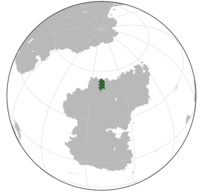Toykisha
Toykishan Federation | |
|---|---|
| Anthem: Hail Toykisha, Hail! | |
 | |
| Capital | New Rochester |
| Largest city | Zanhae |
| Official languages | Fluvan |
| Ethnic groups (2022) |
|
| Demonym(s) | Toykishan |
| Government | Federal parliamentary republic |
| Bernard Hoffson | |
| Chu Kyu-Bong | |
| Martti Pekkarinen | |
| Legislature | Federal Assembly |
| Independence from Fluvannia | |
| Early 1800s | |
| 1 June 1858 | |
| 31 May 1910 | |
• Republic | 31 May 1961 |
• Current Constitution | 27 April 1994 |
| Area | |
• Total | 259,647 km2 (100,250 sq mi) |
| Population | |
• 2021 estimate | 17,432,123 |
• 2020 census | 17,158,512 |
• Density | 66.09/km2 (171.2/sq mi) |
| GDP (nominal) | 2022 estimate |
• Total | |
• Per capita | |
| Gini (2022) | very high |
| HDI (2022) | high |
| Currency | Toykishan Mark (₼) (TKM) |
| Date format | mm-dd-yyyy |
| Driving side | right |
| Calling code | +288 |
| ISO 3166 code | TK |
| Internet TLD | .tk |
Toykisha, officially the Toykishan Federation is a country in northwestern Stratea. It is bordered by Pätschlàn to the east and the Achrinian Ocean to the north. Toykisha's location between Abos and Stratea has contributed the country's history as a trading center, earning it the nickname "Crossroads of a Hemisphere". This location has also led to a cultural identity marked by religious and ethnic diversity. Located in the Manovan World , the country has roughly 17.4 million people and covers an area of 259,647 square kilometers. The capital is the former colonial town of New Rochester, but the largest city is the Buheyen-dominated city of Zanhae. While Pätschlàni and Buheyeo are also official languages, the local dialect of Fluvan commonly serves as a langue véhiculaire for the country; Pätschlàni is the country's vernacular, though Fluvan plays an outsized role in formal situations due the higher average wealth of Fluvan-speakers, with Buheyeo being mostly limited to certain regions of the country.
The earliest evidence of human civilization in the region dates back to as far as 21,000 years ago. While the region was primarily inhabited by Pätschlàni-speakers it was joined politically to the Manovan Empire sometime in the early first century AD. After the decline of the Manovan empire, various independent Pätschlàni states would control what is now Toykisha. At this point in time it is believed that Umitaku traders would come into contact with the Pätschlàni states. This trade would result in the naming of the country, "遠い岸辺" (Tōi kishibe), which would be fluvanized as "Toykisha". In the early 1800s AD, Fluvannian traders would establish a series of corporate-owned trading outposts, primarily owned by the Toykishan Company. In 1858, amid a greater interest in the region by Fluvannia, the Toykishan Company was nationalized in 1858 and the various corporate colonies would be placed under government control. As a part of this nationalization, the Fluvannian government would expand its holdings into the interior, annexing parts of Pätschlàn and the Buheyen Kingdom.
Just prior to the First Great War, the seven colonies constituting modern-day Toykisha were federalized into a common colonial government, to be given home rule by Fluvannia. Under this structure, the Toykishan colonies, or provinces as they came to be known, were established under a nominally democratic government. However, this nominal democracy was dominated by the interests of powerful corporations and landed, primarily Fluvan-speaking, families. The colony fought alongsideside the First and Second Coalitions during the First and Second Great Wars, respectively. Toykisha lost territory to Pätschlàn after the Second Great War and after the war ended it gained independence from Fluvannia. In 1961, Toykisha declared itself a federal republic amid a closer relationship to the communist states in Stratea, though it never formally sided with the communists and remained neutral during for most of the Third Great War, joining the Third Coalition towards the end of the war. Since the end of the Third Great War, the country has remained mostly neutral, though it tends to align itself towards the Nord.
Toykisha is a developing country, ranking at 0.731 on the Human Development Index. It has been classified as an upper-middle-income state. However, the country struggles with nationwide corruption and wealth inequality, with most of the wealth belonging to Fluvan-speaking landed families, which also control much of the country's resources. Currency instability is common, with Toykisha having one of the highest rates of inflation in the world. Toykisha is a member of several international organizations, including the Global Community.

